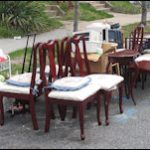We’ve been living with the COVID-19 epidemic in Virginia for more than four months now. Given the fact that hundreds of thousands of our fellow citizens have lost their jobs, it should not surprise us that some have had trouble paying their rent.
But I am surprised to read that Virginia is in the midst of a full-blown eviction crisis. Apparently, there is a backlog of more than 12,000 eviction cases in the courts. The Supreme Court of Virginia suspended eviction hearings in the early weeks of the epidemic, but let eviction proceedings resume May 18.
“People who did all the right things, who worked and were able to pay their rent and their bills have found themselves our of work and also out of money,” said Governor Ralph Northam in June. Now spokesmen for the poverty lobby are warning that thousands of people could be thrown into the streets, exacerbating the public health crisis.
There very well may be a genuine problem here. I’m not denying that. But there is more than meets the eye to this eviction crisis, and taxpayers should demand an explanation.
Virginians filed more than 800,000 unemployment claims between March and mid-June, say Tram Nguyen and Elaine Poon, with the New Virginia Majority and Legal Aid Justice Center respectively, in a Virginia Mercury column. Many found new work, leaving 386,000 unemployed at last count.
People losing their jobs are entitled to unemployment insurance, which ranges between $60 and $378 a week, depending upon lost wages. Not only that, thanks to the federal CARES ACT, workers received a $600-per-week unemployment supplement through July 31. In other words, the typical laid-off worker was bringing home more than $3,000 a month, not counting benefits such as food stamps, Medicaid, and other forms of assistance. Financially, most laid-off workers were better off than when they were working.
But the story doesn’t end there. Governor Ralph Northam allocated $50 million in CARES dollars to mortgage and rent relief. To be eligible, recipients must have been laid off, experienced a reduction in work hours, lost child or spousal support, or had to stay home to care for children. (The program is limited to recipients making less than 80% of their locality’s median income.) “Communities of color,” which experience higher eviction rates, are being targeted for outreach. The state website does not say how much money it is willing to dole out, but we can make an order-of-magnitude guess at how many people the program can help. If the mortgage/rent relief program pays $600 lump sums on average — enough to help most low-income people over a one-month hump for paying the rent — it would provide assistance to more than 80,000 households.
Last but certainly not least, there was the federal stimulus payment mailed to every taxpayer. Low-income households should have received up to $1,200 per tax filer.
So, here’s my question: Thanks to all the stimulus dollars, the poor and unemployed are awash in more money than they are accustomed to. Why can’t they pay their rent? Indeed, why aren’t they catching up on back rent?
One possibility is that they aren’t getting the money. Maybe the Virginia Employment Commission, overwhelmed with unemployment filings, has been slow to push out checks. Maybe the US Post Office is to blame and checks are getting lost in the mail. We haven’t heard about either scenario being the case here in Virginia, so I’m skeptical that this is an explanation, but you never know.
Another possibility is that poor people became suddenly overwhelmed with additional financial burdens due to the epidemic. I don’t know what they might be — other than stocking up on masks and toilet paper. There’s a vast poverty industry out there to highlight every hint of human misfortune and suffering befalling the poor, and we haven’t heard about such burdens, so I doubt that this is the explanation either.
A third possibility is that some poor or unemployed people — nine or ten thousand out of hundreds of thousands — are squandering the money on stupid stuff or feeding their drug/alcohol addictions rather than using it to pay their rent. Indeed, some poor people may see the COVID-virus as license to game the system and get away with skipping their rent payments altogether. If that’s the case, you can be assured that the poverty lobby will not be broadcasting the fact. On the other hand, I have seen no evidence to confirm such a conjecture.
The fact is, we don’t know. And we don’t know because no one seems to be asking the question. One thing we can say with confidence is that there seems to be a mismatch between the inundation of federal and state aid and the surge in evictions. Whatever the explanation, we’re not getting the whole story.



